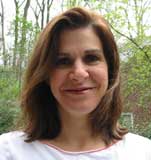Teachers at Work
A column about teaching
Personal Essays in the Classroom

The Paideia School in Atlanta, Georgia, runs an innovative program to help their middle school students become better writers, with an added bonus: it also helps them become better people. How? By focusing their writing on personal essays. One of the teachers who helps shape this course is Andrea Sarvady, a talented educator with a unique background -- she's also an accomplished author and trained therapist. We spoke to Andrea about the program:
VT: Why does your 7th and 8th grade writing program focus on personal essays?
Andrea: For budding writers who are just stretching their wings, their strongest work comes from writing what they know. We use what they've experienced in life to work on various skills such as character, dialogue, tone and the like. This is the basis of the two-year program.
VT: How do you keep the work interesting for such a long period?
Andrea: We give them a lot of freedom of choice. We don't say, okay this month you're going to write about a vacation or this month you're going to write about your mom or whatever. For the most part, we meet with them in one-on-one conferences and help them think about what their next story might be. They may talk about what's on their mind or an anecdote they remember from earlier in childhood or perhaps a relationship in their life that's taking a turn.
Maybe they're close to their grandfather and he's getting sick. Maybe they had a best friend in second grade who is not so close anymore. We help them figure out what aspect of their life they're interested in writing, and they just go for it. Depending on the student, it might be a ten-page paper due in two weeks, or shorter assignments about various things. We try to tailor it to a level that's comfortable for them.
VT: Have students embraced this approach?
Andrea: They like that somebody wants to hear about their lives. They seem drawn to the notion that their life is a story with interesting characters and captivating dialogues and a particular point of view. It doesn't really occur to them because self-esteem can be pretty low at early adolescence. You think you're boring and your life is boring. Although by this process of writing up your life for two years is certainly not intended as therapy, it really seems to have a therapeutic side effect. The kids learn to see themselves as interesting narrators in the really interesting story of their own life.
VT: Do you think this approach has helped them become better writers?
Andrea: Absolutely. I have been floored by the level of writing that I've seen out of kids whose basic grades and test scores didn't necessarily indicate that this would be a strong gift of theirs. Their writing has blossomed by telling stories about their own life, writing that they can translate into fiction and other forms later.
VT: What about conventional writing assignments about, say, To Kill a Mockingbird?
Andrea: They still write about To Kill a Mockingbird and whatever other books they're reading in Lit, they still do the basic literature essays. The personal essays are just another component that we feel is important enough to be its own separate category of writing.
Sometimes, too, the kids tell us that they miss writing fiction. A lot of them enjoy fantasy or Sci-Fi and they miss doing it. They can get independent or extra credits for doing that kind of writing because we want kids to pursue their passions.
VT: What has been surprising about focusing on the personal essay?
Andrea: The editing process with this kind of writing can be complicated because it's a combination of things. We write in the margins about grammar and spelling, punctuation, not having fragment sentences and the like. But if they write about a really complicated conversation they had with someone and we might ask in the margins, how did you feel about this? What was your emotional reaction to this?
VT: How else have you seen this program help students?
Andrea: Even though this writing program isn't therapy, I think it absolutely helps in a therapeutic manner. I think it helps a lot of kids look at their own life a little more closely at an age where impulse controls issues are so huge. It's just a great way to deal with being thirteen and learning how to be a writer. I feel like it's pretty effective.

